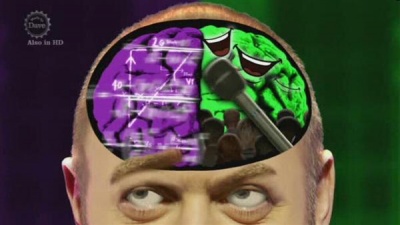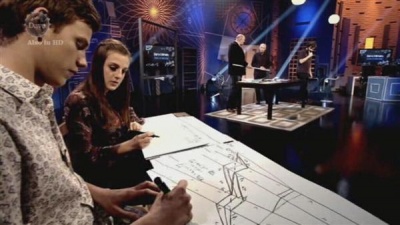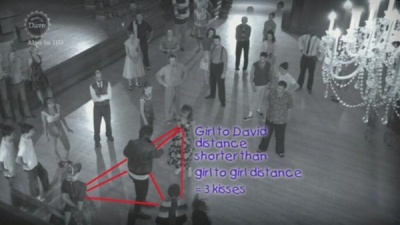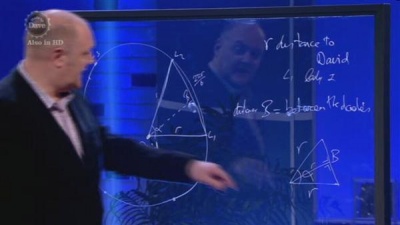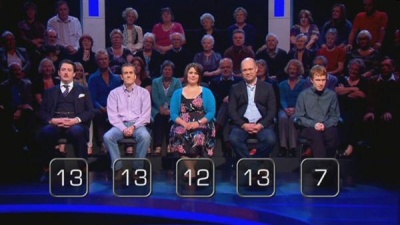Weaver's Week 2012-04-29
Last week | Weaver's Week Index | Next week
The O'Briains Trust asks: "If a programme is transmitted, but every television set in the land is switched to something else, is the show really broadcast?"
Contents |
School of Hard Sums
Fujisankei Communications International and Wild Rover for Dave, from 16 April
"Possibly the most nerdy programme ever made," says Dara Ó Briain of his new show. That's fighting talk where we're from: what about Minor Celebrity Dungeons and Dragons? In this programme, Nordraak the Drowflayer (played by Tim Harford) invents and improvises a battle between the Neophytes (Andrew Edmonds, Laura off of World Series of Dating, and Laurie Penny), and the Wizened Warlocks (Eddie Mair, China Miéville, and Michael Gove).
Or, in the realms of actual broadcasting, what about The Brains Trust, in which some of the greatest minds of the 1950s investigate philosophical conundra, such as "are there circumstances under which Malthus could be correct?", and "how would it be feasible for a spacecraft to be re-usable?", and "what is the plural of referendum?" Listeners to The Third Programme (Mr. and Mrs. Sidney Bonkers of North Hampstead) would have something to think about, if only "is it possible to devise a radio receiver with adjustable tuning".
So, no. School of Hard Sums isn't the nerdiest programme ever made. It's not even the nerdiest programme made this year, we've seen University Challenge, we've seen Mastermind, we've seen Dick and Dom's Diddy Movies. That last one may have been a mistake. But we do agree with Dara when he says that the application of mathematics and logic can solve everything. Some things can take a bit of thinking about – there's a class of problems that cannot be solved in a finite length of time, such as the optimal route for a bee to sup nectar from a never-ending stream of flowers. School of Hard Sums tackles more simple problems, ones that can be resolved in a half-hour programme.
The format is simple. Marcus du Sautoy is in the studio, and he's come equipped with some problems. As well as Dara is a guest comedian, in the opening shows we've had David O'Doherty and Countdown's Alex Horne. The stars are also joined by The Maths Department, two students hoping to attain a mathematics degree from a leading university, just as Dara achieved some years ago. This is all a replica of Takeshi Kitano's original Japanese programme.
Marcus poses his problems, and we see both Dara and his guest comedian having a crack at them. Sometimes, we get to see frustration on the face of the host. Sometimes, we're able to see him mugging with the students to fill in time while the guest is struggling. Often, neither host nor guest is entirely sure about their solution, and Marcus needs to give the correct answer, and explain why it's the correct answer. That explanation lies at the heart of the programme: School of Hard Sums isn't just about getting the right answer, it's about the reasons why this is the right answer and demonstrating that any other answer is wrong, and has to be wrong.
For example, one question in the first programme was about David O'Doherty getting kissed at a dance. He has to arrange people so that they're closer to him than to anyone else. How many kisses can be obtained in this way?
In solving this problem, David quickly hits on the idea of arranging people so they're all at equal distances from him. He can get three kisses, because three people on the corners of an equal triangle are all closer to him than to each other. Does this hold for four people? Yes: again, people at the corners of a square are closer to the man in the centre than to each other.
Back in the studio, Dara is thinking in more general terms. If there's a three-sided arrangement with equal sides, and a four-sided arrangement with equal sides, then everyone's standing on points around a circle. This leads him to think about isosceles triangles, because any two points on a circle must be the same distance from the centre of the circle, the radius of the circle. All he wants is for the straight-line distance between two people to be more than the radius of the circle.
So if the radius is r, then he needs the distance to be greater than r. Now, isosceles triangles can be split down the middle to form two equal right-angled triangles, splitting the third side equally, and halving the angle at the middle of the circle. All Dara then needs to remember is that if this opposite side must be at least r, then half of the opposite side must be r/2, and he remembers that the sine of 30 degrees is r/2.
So that halved angle in the middle must be a bit more than 30 degrees, and the full angle must be slightly more than 60 degrees. As there are 360 degrees in a full circle, he can only fit in five slices of slightly more than 60 degrees. Six times 60-and-a-bit degrees is 360-and-six-bits degrees, and that's too many, but five times 60-and-a-bit is 300-and-six-bits, and that's OK.
Five is the answer, and Dara and David and Marcus and the students all give their explanations. Sometimes there are wildly different methods of reaching the same answer. This doesn't matter: all of the routes to the solution are valid, and the important bit is that host and students and guest show their working so they can explain to each other where they went wrong.
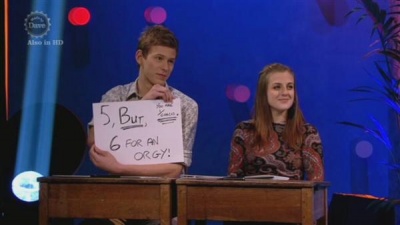 If there were six people around the circle, Dave would get kisses from all, but they'd also kiss two other people. And we can't show that at 8pm.
If there were six people around the circle, Dave would get kisses from all, but they'd also kiss two other people. And we can't show that at 8pm.
School of Hard Sums just about qualifies as a game show, on the grounds that Marcus adjudicates on a winner between Dara and the guest comedian. It reminds us of other shows dealing with logic teasers, Puzzle Panel (Radio 4, 1998-2005) and Mind Games (BBC 4, 2003-5). On all of these programmes, as on School of Hard Sums, the fun came from hearing and seeing great minds struggle, with the viewer thinking that they might get the answer sooner than the "experts" and leave the programme with that glow of intellectual satisfaction.
The show is not obvious for Dave, but it's a shrewd programme to commission: it slots in next to QI and Big Ask as being gently improving, learning through entertainment and with familiar faces to ensure it never feels didactic. The programme is rigorous and accurate without ever being starchy: it has a less formal tone than BBC4 would ever allow, and a more intellectual tone than BBC3's comfort zone. We understand that Dave thought they were making a straight-up comedy show, however often Dara told them, it was popular science.
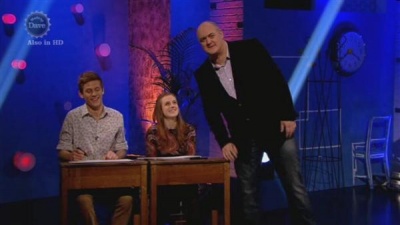 Dara, Nobody Likes a Smartass. Oops, wrong show.
Dara, Nobody Likes a Smartass. Oops, wrong show.
Sadly, we don't think the atmosphere quite works: we're of an age to remember Johnny Ball explaining mathematics in his whizz-cap style, and whatever Dara Ó Briain might be, he's no Johnny Ball. School of Hard Sums solves problems, it doesn't open up the wowsome world of mathematics as well as it might. But it's a good start, a lemma from which to build a full theorem.
Mastermind
Second Round, Match 6
Once more unto the semi-finals, once more. 8pm Friday, except for viewers watching something else, because it went out across the UK at the same time.
Eliot Wilson kicks off tonight, taking the Life and Times of Harold Macmillan (1894-1986). The member of parliament for Stockton, and latterly Bromley, had an undistinguished backbench career, and wasn't appointed to cabinet until the 1950s. He succeeded Eden as prime minister, starting the march to independence for colonies, and creating a forum between trade unions and employers. A scare against his health caused Macmillan to resign as prime minister in 1963, but he survived to become the Earl of Stockton twenty years later. A bit of a flub in the middle, but 13 (0) is a grand score. Read more: Biography by Charles Williams.*
Quentin Holt will be telling us about Sir Isaac Newton (1642-1727). The inventor of calculus, author of Newton's Law of Motion, and discoverer of gravity, Newton was also the manager of the Royal Mint, where a pioneering study enabled him to ease the bottlenecks in the production of coins. With a little leniency from the host accepting an answer long after the buzzer, a perfect round is achieved: 13 (0). Read more: Michael White's biography*.
Sarah Waller joins us for the History of the Cayman Islands. An archipeligo in the Caribbean, the Caymans are a British Overseas Territory. The islands were settled by pirates, shipwrecked sailors, deserters from Oliver Cromwell's army, ex-slaves, and people fleeing the Spanish Inquisition. The population of 52,000 supports almost a million companies, attracted by the negligible tax rates and offer of citizenship for £600,000. A snip! Not quite a perfect round, ending on 12 (1). Dodge more: Nicholas Shaxson on great tax havens*.
Mark Wyatt returns to the chair, taking the TV series "Band of Brothers" (2001). Based on a 1992 book*, the eight-part drama told of an army company dropped behind German lines in World War II, as forerunners of the main Allied invasion. The show was produced by Steven Spielberg and Tom Hanks, and starred Dexter Fletcher from Press Gang and Gamesmaster. Another strong round ends on 13 (0). Watch more: the DVD*.
And finally! Simon Alvey has 90 seconds on the British Civil Wars in the 17th century. These were primarily a series of skirmishes between those who believed the monarch should rule by decree, and those who reckoned that some check by parliament was necessary. The subject includes uprisings in Scotland, and the eventual removal of the non-king Cromwell and restoration of proper king Charles. Not quite as good as the others, this round ends on 7 (0). More war: a history of the era*.
Simon Alvey got here on 16 December, when he won with "The West Wing". He sets a decent total – 16 (4) – and as the night's youngest contestant, we're sure he'll be back in the semis in a few years' time.
Sarah Waller won one of the shows on 6 January, when she took the Life and Work of Antonia Forest. She begins with another pass, but remembers skiing's snowplough move, whatever happened to Piers Morgan, the cruciate ligaments, and the nomenclature of features on Venus. 21 (6) is the final score.
Eliot Wilson got here as a runner-up, he took Enoch Powell – another Conservative politician – on 10 February. He knows about the song "Woodstock", types of acid, but – ah! – brings in a pass. He's already made a couple of mistakes, which could prove fatal, and the round ends on 22 (4). Doesn't feel like a winning performance.
Quentin Holt got through in the last heat of 23 March when he studied the London Olympics. The Archers and some sheep form a linked pair of answers; the contender goes on to answer questions, but surprisingly many of them incorrectly. Sandi Toksvig for Counterpoint? Naaah, we'd rather let celebrity lookalike Sue Perkins have the gig. 19 (0).
Mark Wyatt won on 20 January, when his specialist subject was Nick Drake. Ten to win, and he gets the bow, and Helena Bonham-Carter, and the omnibus volume, and the Battle of Stamford Bridge (in which King Harold beat Barcelona 3:1). There's a couple of errors, and one pass, but Betty Boothroyd's dancing past helps keep him in the game. The correct answers come along so slowly, eventually passing the line with three questions to spare. 25 (2) is the final, and winning, score.
All of which brings us to the final next week. Except, with a certain inevitability and a grotesque irony, it's not next week. The movable feast of Mastermind (especially for viewers in Wales) has run up against the iron-clad hulk of SS The Snooker, and loses its slot to live sport. That's actually true in all parts of the UK, it's Saturday night when Wales and Northern Ireland opt out for live rugby.
The Mastermind final will air on 11 May at 7.30. Nationwide. Except for viewers in Wales, who will have to wait two hours.
This Week And Next
Darcey Bussell is the new fourth wheel on Strictly Come Dancing, joining Len and Craig and Bruno by giving her opinion on what she's seeing in front of her. She replaces Alesha Dixon, who has left the constructive talent show industry.
From the OFCOM complaints bulletin, we see 11 people have complained about the scheduling of Four Rooms. We're not sure what the problem is: do they believe Jeff Salmon's scarves are too scary for 8pm? One person moaned that Mastermind was materially misleading, and someone bleated that The Bank Job contained offensive language. We know that everybody dislikes that G****e L**b, but is his name now more profane than Voldemort? The regulator is looking into Britain's Got Talent for 31 March, for reasons that are not apparent.
Ratings in the week to 15 April show The Voice of Holland UK clearly winning: 12 million is a remarkable score at any time of year. Britain's Got Talent "only" achieved 10.45m viewers. 8.05m for The Chance, and Have I Got News for You returned to 6.15m viewers. In It to Win It (4.35m) beat The Cube (4m) and Family Fortunes (3.35m). The Chance You're Fired led BBC2 with 3.2m, ahead of a rare fully-networked Mastermind (2.25m). The Million Pound Drop was Channel 4's biggest game show, with 1.75m viewers.
Over on the digital channels, 2.65m saw Celebrity Juice. What's that got that Mastermind hasn't? Fearne and Holly, Rufus Hound, Jedward, consistent scheduling. 1.1m for Britain's Got More Talent, and the Sunday catch-up ended in a draw, with BGT and TVoH-UK both recording 875,000 viewers. Elsewhere, 290,000 for The Chase on ITV+1, 255,000 for Junior Masterchef Australia on Watch, 165,000 for The Love Machine on Living), and – in a measure of spectacularly niche programming – BBC Parliament's fourteen-hour repeat of Election 92 averaged 6000 viewers.
Maestro at the Opera (BBC2, 9pm Friday) is this week's big new series. Before then, there's a profile of Hughie Green (ITV, 7.30 Wednesday), and new Total Wipe Us Out (Watch, 7pm Sunday). Next Saturday's The Voice UK goes out at 7.10, bookending into the final Britain's Got Talent heat at 8.45 – the live semi-finals begin the following night. An edition of The Cube is down for 7.45, but that'll likely be postponed if the Men's FA Cup Final at Wembley Building Site goes to extra gravel, or kicks from the cement mixer.
Links marked with a * help support the UKGameshows servers.
To have Weaver's Week emailed to you on publication day, receive our exclusive TV roundup of the game shows in the week ahead, and chat to other ukgameshows.com readers, sign up to our Yahoo! Group.

